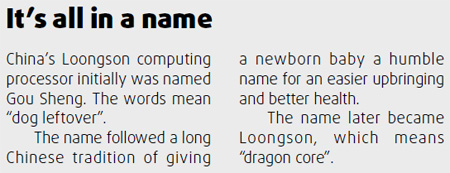ICT Fast-tracks Work on Loongson
Purchasing outside technology will allow the Institute of Computing Technology (ICT) of the Chinese Academy of Sciences to fast-track commercialization of the government-funded institute's Loongson family of computing processors, analysts said.
"ICT had long sought to develop microprocessors with its own intellectual property. But that strategy, if it had continued, would have been a waste of the government's investments," said Wang Yanhui, an independent industry watcher.
"I think licensing from MIPS Technologies Inc is a good choice for the development of Loongson," Wang said.
ICT in June licensed the use of trademarked MIPS32 and MIPS64 computing technology architectures from US-based MIPS Technologies.
The Chinese government had been actively seeking to develop its own computer chips, and in 2001 introduced the Loongson chip project.
The government invests about 20 million yuan annually in the project, Hu Weiwu, the chief architect of Loongson, said.
But most of the technologies that Loongson used were from MIPS.
"Buying licenses from other companies is not a failure of our self-development strategy. What we want do is expand Loongson's value in the marketplace," Hu told China Computer World in an interview last month.
Unlike processors from Intel and Advanced Micro Devices, Loongson does not support the x86 processors used in most personal computers.
While the internal micro-architecture was independently developed by ICT, Loongson lacked four architectures -- architectures that had been patented by MIPS Technologies -- to achieve compatibility.
Loongson spent several years in efforts to obtain the licenses, but cited the high royalty fees.
"At that time, we only had 20 million yuan in government investments each year, but MIPS Technologies was asking for $5 million (about 34 million yuan)," Hu said.
ICT reached a deal with MIPS Technologies and also signed a five-year contract with ST Microelectronics to help market Loongson products.
"Our deal with ST Microelectronics largely expands Loongson's market because if we are MIPS compatible, most open source software will support us," Hu said.
Hu said by obtaining licensed architecture directly from MIPS Technologies, open source systems such as Google's Android, Sony's PSP and Microsoft's Windows CE will all support Loongson.
"And MIPS Technologies' licensing fee now is much lower in the global economic slowdown," Hu said, declining to disclose the price of the deal.
MIPS Technologies' share price surged on NASDAQ after announcing the deal with ICT.
Hu said ICT can now accelerate development of its Loongson family of processors.
Lemote is a joint venture between Jiangsu Menglan Group and ICT to promote Loongson.
The alliance includes software vendors, sales companies and computer chip research firms.
"Five years ago, we only had a protocol and did not have the ability to commercialize Loongson," Zhang Fuxin, general manager of Lemote, told China Business Network's CBN TV.
"But now it's different," Zhang told CBN.
He said Lemote now is preparing for a possible initial public offering.

(Source: China Daily)
2013-07-17 Print
Print